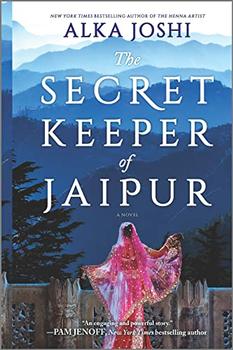Summary | Excerpt | Reading Guide | Reviews | Beyond the Book | Readalikes | Genres & Themes | Author Bio

The Jaipur Trilogy #2
by Alka Joshi
Grandmother Sushila, toothless, gray whiskers poking out of the triangular tattoo on her chin, would begin one of the folktales told to her by her grandmother. So the king commanded the queen to weave a blanket for him from the finest wool, which he knew would take her the better part of ten years. We all knew the story by heart and would finish the final sentence for her, at which point she would look at us with a frown. Oh, you know that one already?
Having sold the wool from our sheep in the lower Himalayas, we would be flush with our winter purchases: a factory-made sky-blue sweater, a Philips transistor radio, a squawking chicken bought at a hill-station market. A few families may have picked up a handsome spotted house goat or a young black bull we would all admire. My sister-in-law would be showing off a new winnowing tray; my older brother walking proudly by her side with his sons. We would wag our heads and agree that the tray could separate the husks from the rice grains much more quickly.
I smile now as I think about those treks through the Himalayan mountains. I feel happy, almost. What would make it complete is a letter from Malik, even if I have to share it with someone else, especially if that someone is Lakshmi. If only I could have attended school, I would not be subjected to the humiliation of having his letters to me sent to her to be read to me.
My goatskin boots make a satisfying squelching sound on the mushy gravel as I conjure ways I would like to stomp Lakshmi Kumar out of my life.
* * *
The day Lakshmi first came into my life, I was not in my right mind. I had been so delirious with fever and grief that I was not even aware of my son, Chullu, coming into this world, two months before his time. Earlier that same day, my husband Dev had tried to drag a young male goat, drunk on rhododendron leaves, back onto the narrow mountain trail. We'd been on our way to our summer homes in the upper Himalayas. Dev lost his footing, and both he and the goat hurtled hundreds of feet into a ravine. We all saw it happen, but there was nothing any of us could do. We have always known the Himalayas to be the home of the gods—Shiva, Ram and Kamla—all of whom are much more powerful than we are. If they want to take someone from us, that is their right, their privilege. Still, I was not ready to let my husband go. Over and over I cried, Wasn't the goat we sacrificed at the start of our trip enough to protect us? Or was it an evil nazar? That our sheep had produced so much wool the winter before may have aroused someone's jealousy.
I grabbed the shoulders of those near me, screeching into their startled faces, Tell me you didn't give Dev the evil eye! I screamed at Lord Shiva. I beat my fists on my distended belly, promising to give Shivaji the baby if he would just bring Dev back. My father-in-law and my brother had to pull my arms away from my stomach to keep me from hurting the life within. The women rubbed my temples, hands and feet with warm mustard oil until I finally sank into a stupor. Almost a week later, when I awakened as if from a long sleep, I saw little Rekha's face, pinched with worry, hovering at the edge of my bed and called my daughter to me. She was just three and didn't understand yet that she might never see her father again. It was then that my father-in-law told me about the doctor and doctrini who had come from Shimla to tend to me; my body had needed medicines stronger than our tribe carried. My husband's father spoke to me through a curtain that the women had erected to keep nursing mothers isolated for the eleven days after a baby's birth. I looked down and noticed for the first time a sleeping baby boy in the crook of my arm, his head slung away from my leaking breast, his rose-colored mouth drooling pale blue milk.
How could I ever have wished this baby away? In him Shiva had given me Dev's fine nostrils and wide forehead, the slight curl in his hair. I asked Rekha to climb onto the blanket with us and say hello to her brother Chullu.
* * *
The next time I met Lakshmi Kumar was also the day I met Malik, last June. I was selling flowers along the main walkway in Shimla. Rekha was three, a serious girl, and I had asked her to watch her three-month-old baby brother. That morning in the Shimla woods, I had picked roses, daises and buttercups for tourists and perennial visitors, and for the discerning buyer: peonies, yarrow and foxglove. Living as I had with my tribe, I knew how certain flowers could cure aches and coughs, ease monthly bleeding, lull fretful bodies to sleep.
Excerpted from The Secret Keeper of Jaipur by Alka Joshi. Copyright © 2021 by Alka Joshi. Excerpted by permission of Mira. All rights reserved. No part of this excerpt may be reproduced or reprinted without permission in writing from the publisher.




A million monkeys...
Click Here to find out who said this, as well as discovering other famous literary quotes!
Your guide toexceptional books
BookBrowse seeks out and recommends the best in contemporary fiction and nonfiction—books that not only engage and entertain but also deepen our understanding of ourselves and the world around us.